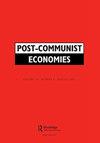玻璃天花板还是玻璃悬崖:女性董事会成员对波兰市场表现的作用考察
IF 1.8
3区 经济学
Q2 ECONOMICS
引用次数: 0
摘要
本文章由计算机程序翻译,如有差异,请以英文原文为准。
Glass ceiling or glass cliff: an examination of the role of female board members on market performance in Poland
ABSTRACT We examine gender bias related to the effect of women in executive management leadership. Specifically, we examine when women are recruited to executive positions and follow companies’ market performance before and after their appointment. Our study is conceptually situated within the field of queuing theory, suggesting certain patterns of labour market queuing behaviour according to race, gender, and class. We formulate two hypotheses: (1) the presence of female executives is associated with lower firm value; and (2) companies with female-centric executive boards are valued lower by investors than companies with male-centric boards. We test these hypotheses employing panel data, using a unique sample of 159 companies listed on the Warsaw Stock Exchange in the years 2006–2015, with hand-collected data on the number of female directors on executive boards. Our results suggest that market queuing behaviour is evident in the case of Poland. Men are more often hired in executive roles than women, whereas females are more likely to be appointed to executive boards in firms which are performing poorly. Moreover, higher participation of women in executive positions is associated with resulting lower value in the long run. According to our interpretation, isomorphism and gender bias diffuse through the reproduction and valuation of capitalist markets.
求助全文
通过发布文献求助,成功后即可免费获取论文全文。
去求助
来源期刊

Post-Communist Economies
ECONOMICS-
CiteScore
4.90
自引率
18.20%
发文量
21
期刊介绍:
Post-Communist Economies publishes key research and policy articles in the analysis of post-communist economies. The basic transformation in the past two decades through stabilisation, liberalisation and privatisation has been completed in virtually all of the former communist countries, but despite the dramatic changes that have taken place, the post-communist economies still form a clearly identifiable group, distinguished by the impact of the years of communist rule. Post-communist economies still present distinctive problems that make them a particular focus of research.
 求助内容:
求助内容: 应助结果提醒方式:
应助结果提醒方式:


